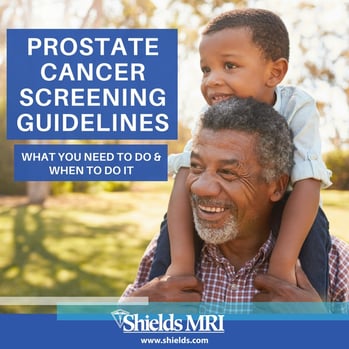
Most people don’t know that prostate cancer is the second most common cancer among American men, affecting roughly 1 in every 7. Early detection is the key to treating prostate cancer – so here is what you should know…..
Who Is Most at Risk?
Every man is at risk; it is estimated that there will be 161,000 new cases of prostate cancer in 2017 alone. It is true, however, that risk increases with age.
According to the American Cancer Society, these are the guidelines for when you should talk to your doctor about planning a screening:
- 50 Years of Age for Men of Average Risk: You are at average risk of prostate cancer and should talk to your doctor about screening options.
- 45 Years of Age for Men of High Risk: You are at high risk for prostate cancer if you are of African American descent, or have had a first-degree relative diagnosed with prostate cancer at an early age (i.e., father, brother, or son below the age of 65).
- 40 Years of Age for Men of Higher Risk: You are at very high risk if you have had more than one first-degree relative diagnosed with prostate cancer at an early age.
Symptoms
As mentioned, in its early stages, it is common for men to experience few to no symptoms of prostate cancer. However, this does not mean you should not be on the lookout for them. Detecting the cancer in its earliest stages can help lead to earlier treatment, and an increased chance of survival in those with a positive diagnosis. These symptoms include, but are not limited to:
- Urinary Issues
- This can include:
- Trouble urinating
- Frequent urination or an urgent need to urinate
- Weak/interrupted urine flow
- Pain or burning when urinating
- Blood in urine
- This can include:
- Constant pain or stiffness in the back, hips, or pelvis
- Painful ejaculation or blood in semen
Next Steps
- PSA Screening
Screening often begins with a simple blood test to measure the level of prostate specific antigen (PSA). If elevated, it might indicate cancer, and doctors are tasked with investigating further.
- Biopsy vs. Multiparametric Prostate MRI
After an elevated PSA, the next step is a needle biopsy, where a doctor takes multiple samples from the prostate and has them tested for cancer. While the PSA test is a relatively straightforward and inexpensive blood test, the biopsy is very invasive, is performed by inserting a thin needle through the rectum, and costs an average of $2,000.
Recent advancements have found that an MRI, in conjunction with ultrasound, can be a much better option from the standpoint of patient comfort, as it is significantly less invasive than a traditional needle biopsy.
Multiparametric MRI (mpMRI) can reveal the size and density of a prostate cancer, and how well-connected it is to the blood supply. The benefit of an mpMRI is that it is a noninvasive and extremely precise way to detect cancerous materials, with no radiation or side effects. While this newer test is not as common as a biopsy, the hope is that with its greater precision, it will reduce the number of biopsies needed.
Why Shields for multiparametric Prostate MRI?
Shields has been a longtime leader in prostate MRI, beginning in 1992, and an early adopter of mpMRI in 2011. Shields radiologists work closely with urologists and radiation oncologists, and have extensive experience in mpMRI interpretation, biopsy planning, and lesion segmentation. Shields radiologists were also represented at the ACR committee for prostate MRI to advise on the use of MRI for prostate cancer.
Shields Health Care Group offers multiparametric prostate MRI services in the following locations:
- Boston (2)
- Dartmouth
- Framingham
- Lowell
- Newburyport
- Springfield
- Wellesley (As of November 1, 2017)
- Weymouth
- Woburn
- Worcester
- Yarmouth
SOURCES:
https://www.everydayhealth.com/prostate-cancer/guide/
https://www.cancer.org/cancer/prostate-cancer/early-detection/acs-recommendations.html



